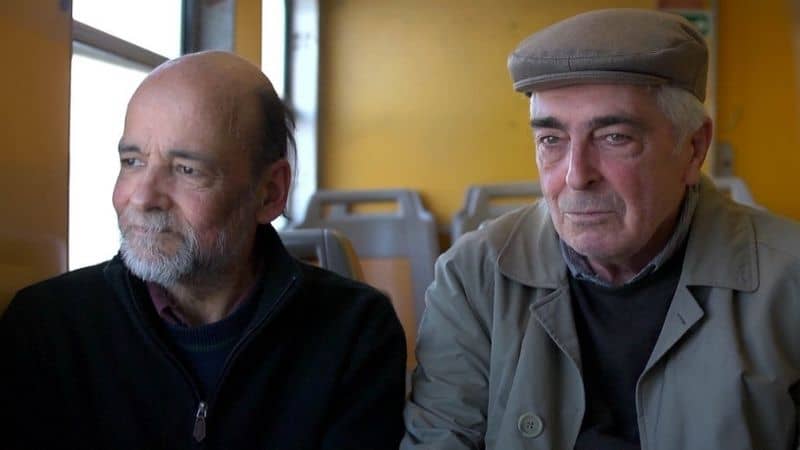Manuel Santos is an old man. We walk with him through the sceneries of a man in the twilight of his life. Amidst cold sweats and nightmares, the cries of this Portuguese colonial war soldier catch us on the raw. Grief from times past haunt him in his old age, some of which is professed, others silent and lonely.
The biography Guerra is a dramatized story of José Lopes. One where the direction of José Oliveira and Marta Ramos feels very close. Sometimes strikingly intimate.
A procession of memories
Manuel Santos, played by José Lopes, is the father of a Portuguese teacher and the protagonist of a procession of memories, images, ghosts, and deliriums. Yet not all moments in the life of our old soldier emerge painfully from his memory. Some also do so from a sweet and cruel melancholy.
The Portuguese colonial war encompasses a set of campaigns in Angola, Cavo Verde, , Mozambique, and Guinea Bissau, in the between 1961 and 1974, which still generate much controversy and open debate. Within the rationale of the pluri-continental empire, these used to be known as overseas campaigns. It was not until the Carnation Revolution that the political change in Portugal forced the collapse of the military logic in Africa.
Up to 3 United Nations resolutions urged Portugal to negotiate independence processes with the African independence forces in the colonies, but it wass ultimately the enormous cost of this unsuccessful war that lead to the collapse of the Salazar regime, cascading into modern Portugal.
Admittedly, this context appears in Guerra only as a subtext. It is far more important to explore the individual side of the matter. Manuel Santos, who was perhaps among the nearly 800,000 people of Lusitanian origin who returned – in the chaotic retreat that within a few weeks filled Portugal at the end of the colonial war – finds himself with phantoms from a time long gone, yet terrifyingly present. He also finds existential questions for an old man that go beyond war. Questions about life, sorrow, death…and the fragility and sadness that takes some men away, or plagues them with despair until the end of their days.
Far away, at home, there’s a prayer:
«Let him return early, and well!»
(Knits the Empire weaves!)
Lies dead, and rots,
a mother’s little boy.
(Fernando Pessoa O menino da sua mãe)

Unpaid debts
Manuel, who is a tender father and family man when accompanied, in his solitude visits sceneries where his mind falls apart. These are the cracks of an unpaid debt to soldiers; sent to distant jungles to fight for men who would never step on the battlefield. Men of war. Men of suffering.
When do the blood, the explosions, and the horrors impacted on the youth sleep? Do the terrors of war ever recede?
A portrait of fragility and integrity. That of a man who has lived what simply should never be must raise some questions. So does the death of those who are still remembered, and the scars left on those who had a different fate. Is there a casus belli?
«Of all the questions that man has asked himself throughout history, the darkest, perhaps also the most elusive, is the justification of war»
Nostalgia is, from its very coinage, a soldiers’ longing. So is the melancholy of this man, yet not for a faraway home. A group of soldiers, young friends, play football, in the half time between deployment and combat. Or they eat a can of beans while guarding a post in Guinea-Bissau.
Today I may still be in hell…but tomorrow heaven will be whole, clear, and clean.
How many times does a soldier return to live the memories he has collected?
Manuel, who is a tender father and family man when accompanied, in his solitude visits sceneries where his mind falls apart.
Elusive betrayals
At the centre of the reflection that Guerra invokes is the elusive betrayal that combatants suffer. Soldiers, pawns by definition, break the seams of their narrow roles. The logical corset of the soldier, by necessity, denies the expansive complexity of the human being. The perfect soldier could only be a machine.
The fact that young soldiers are drafted to war is an offense to humanity. And yet it is difficult to argue with the logic of the fatherland. The pride of war. The urgency of war. The inexorable necessity of war.
To discuss the arguments for war with the fatherland is to discuss its existence. Yet one would like to think that a nation can live without war. Or that there is such thing as a national entity that can actually exist without a military entanglement. But the concept of a nation is a play predicated upon the protection of a territory against other similar entities. Its very definition lies in the borders it defends or conquers. And a nations’ nature changes when it denies or loses these borders. Just as Portugal changed at the time and abandoned its empire. And it gave way to a new country. A new territory redefined. A new fatherland.
But what does the empire matter to a soldier? or to an old man?






